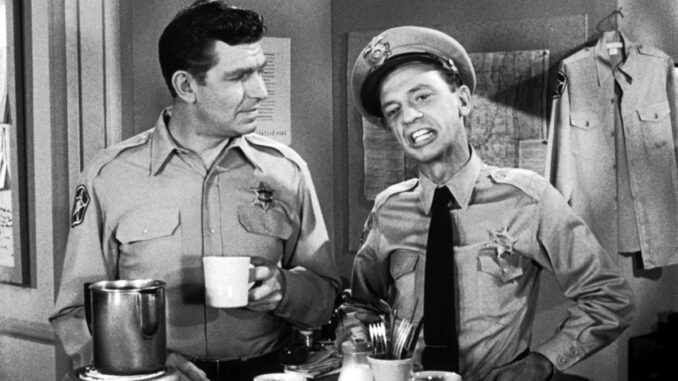
In the gentle, sepia-toned world of Mayberry, where the most pressing legal matter was usually a stray goat or Otis Campbell’s periodic overnight stay, lived Deputy Barney Fife. A man of immense enthusiasm and microscopic competence, Barney was a walking, talking paradox of earnest intent and accidental chaos. His single bullet, clutched close to his chest, symbolized not just his authority, but the precariousness of his own self-belief. What, one might ponder, would happen if this well-meaning bundle of nerves were to intersect with an event of truly monumental historical gravitas, say, the Great Emancipation? The result, assuredly, would be less a historical turning point and more "The Great Emancipation Mix-Up," a comedic ballet of bureaucracy and blunder that, while fictional, illuminates profound truths about human nature.
Imagine, if you will, the year 1863, but instead of the austere halls of Washington D.C., the epicenter of a certain proclamation shifts, by some cosmic misdirection, to the sleepy town of Mayberry. President Lincoln, perhaps suffering from a severe case of hay fever and a misfiled telegraph, entrusts the dissemination and, crucially, the implementation of the Emancipation Proclamation not to generals or statesmen, but to the most available "man of law and order" on the nearest rural map: Deputy Bernard P. Fife.
Barney, upon receiving the sealed dispatch – undoubtedly ripped open with feverish excitement and a splintered thumbnail – would be instantly overwhelmed. His eyes, already prone to widening into saucers at the slightest deviation from routine, would practically pop from their sockets. The weight of such a historic document, demanding the liberation of millions, would not inspire awe in Barney so much as a frantic search for the proper filing procedure. "Golly, Andy!" he’d exclaim, brandishing the proclamation like a hot potato, "This here's a mighty big one! Says here… 'all persons held as slaves… are, and henceforward shall be free.' Now, do you reckon that means they need a permit to be free? Or a stamped form? We haven't got a form for 'freedom' in the Mayberry courthouse!"
The "Great Emancipation Mix-Up" would not be born of malice, but of Barney's quintessential small-mindedness, his inability to grasp the grand sweep of an idea when confronted with its granular, administrative potential. He wouldn't see the historical imperative; he'd see a logistical nightmare. His first order of business would undoubtedly be to establish "Freedom Zones," perhaps clearly marked with hand-painted signs on Andy's fence posts. He'd worry about the proper identification for newly emancipated individuals – "Do they get a badge? A special armband? We can’t have just anyone claiming to be free without proper identification, Andy! It’d be chaos!"
His "enforcement" of emancipation would likely involve a series of well-intentioned, yet utterly misdirected, edicts. He might deputize Goober Pyle to manage "freedom traffic flow" down Main Street, ensuring that all newly free citizens adhere to the unspoken Mayberry rule of not loitering too long by Wally's filling station. He’d fret over the lack of proper documentation for their journey, perhaps trying to issue "Freedom Passes" stamped with the courthouse seal, or requiring them to report to Mayor Stoner for a brief "orientation on liberty" that would mostly consist of a lecture on town ordinances. The very notion of self-determination would be alien to Barney, who saw the world through a prism of rules, regulations, and the pressing need to "nip it in the bud!"
The humor, of course, lies in the stark, almost painful, juxtaposition. The solemnity of human liberation, a concept that shook the foundations of a nation, reduced to a bureaucratic snafu in a tranquil, fictional town. Yet, beneath the laughter, there's a poignant truth. Barney Fife, for all his ineptitude, embodies a universal human failing: the tendency to simplify the complex, to reduce the profound to the manageable, and to project our own limited understanding onto vast, overwhelming realities. The "Great Emancipation Mix-Up" reminds us that even the most pivotal moments in history are often implemented by ordinary people, some of whom are simply trying their best, however misguided, to navigate a world far bigger than their filing cabinets and their single, silver bullet.
In the end, Andy Taylor, with a knowing sigh and that characteristic gentle wisdom, would undoubtedly have to step in. He'd patiently explain that freedom wasn't something you handed out with a form, or enforced with a traffic whistle. It was a state of being, a right, a profound shift in the human spirit. Barney, perhaps a little crestfallen but ultimately resilient, would likely put away his "Freedom Forms," polish his bullet, and return to chasing jaywalkers, still convinced he had, in his own inimitable way, played a pivotal role in the "Great Emancipation." And in that, there’s a lesson for us all: the grand narratives of history are often woven not just by giants, but by the earnest, bumbling hands of everyday Barneys, reminding us that even in the face of the monumental, the human comedy—and its inherent mix-ups—will always endure.